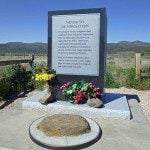Lectionary Reflections: Year A
Easter Day
April 24, 2011
Psalm 118:1-2, 14-24
Of course, every Christian preacher will use one of the gospel accounts of the resurrection of Jesus as the basis for her sermon on Easter; in year A that account is John's or Matthew's. But to aid the discussion, to add immeasurably to the celebration, I would suggest that the preacher turn to the Psalms, the Bible's quintessential book of celebration. Psalm 118 is a marvelous poem of celebratory praise, of unrestrained thanksgiving, and could serve as a superb call to worship on Easter, as a responsive psalm reading, or as a second reading for the sermon. It bears many of the features that could inform any Easter sermon.
It is always a guess to attempt to determine the specific context of any of the psalms, but this thanksgiving hymn appears to have a pilgrimage to the temple as its background. Thus, we modern readers might picture a journey to the sacred place to thank God for what God has done. Like our trips to our sanctuaries on Easter morning, often filled for the occasion, bedecked and perfumed with lilies, brass choirs and singers at the ready, so the ancient pilgrim in our psalm has come to thank God for God's "goodness" and "steadfast love." The very first verse of the psalm announces the reason for our singing:
O give thanks to YHWH, for he is good (or "who is good");
God's steadfast love (chesed) endures forever!
This ringing acclamation is repeated verbatim in the final verse of the poem (118:29). Within these grand words lie the roots of our Easter faith, and for the ancient Israelite her reason for pilgrimage. The God she and we worship has two primary characteristics: first, YHWH is good. The adjective is the most common of Hebrew words. "Good" means those things that our common English word means: ethical, honest, honorable, moral, right, just, righteous, upright, virtuous, utterly trustworthy. Second, YHWH is best characterized by that marvelous "steadfast love," a Hebrew word notoriously difficult to translate, but impossible not to hold to as basic to the very character of this God. I tend to imagine that the word implies an unbreakable connection to the people. YHWH is to be praised precisely because YHWH has never and will never give up on us.
These two basic facets of the being of YHWH in the poem are then urged to sound from three specific categories of pilgrims: "Israel" (vs. 2), "house of Aaron (vs. 3), and "those who fear YHWH" (vs. 4). These groups appear to mean in order the whole nation, the order of priests, and all those who desire to worship this God. In short, all those within earshot of the eager pilgrim as well as those who cannot hear her! All are called to celebrate the good and loving YHWH.
The lectionary expunges verses 3-13 from our use, but in those places we see the exaltation of YHWH rise to fever pitch. The pilgrim called on YHWH "out of my distress," and God answered (vs. 5). God's answer came in the form of grand triumphs over those who hate (vs. 7), even nations that threaten and surround (vs. 10). But in the face of these perils, "YHWH is my strength and my might, and has become my salvation" (vs. 14).
The psalmist then proclaims, "I shall not die, but I shall live, and recount the deeds of YHWH" (vs. 17). Here, of course, the early community of Christians heard the power of YHWH to bring life from death. As this ancient pilgrim made this claim, so the early Christians, witnessing the torture and death of their master and friend, affirmed the same belief that God was God of life in the face of death. The pilgrim then commanded the temple priests to "open the gates of righteousness, that I may enter through them and give thanks to YHWH" (vs. 19). And just as the pilgrim was desperately anxious to get to the holy place to give her thanks, so the first Christian believers saw here Jesus' empty tomb as nothing less than the "open gate of righteousness," the very tunnel through which they would go to give thanks for God's miraculous victory over death.
The very famous verse 22 that became a watchword for the first Christians was apparently for the Israelite pilgrim a metaphor for their astonishing reception after she first had felt so unworthy for worship and thanks. She was first a "rejected stone," tossed away as useless for any building. But now she finds herself at the very threshold of the greatest of all buildings, the temple, and feels nothing less than a "chief cornerstone" of its construction. The first Christians saw something else here for their faith; they believed their rejected friend now resurrected had become the central cornerstone of the new temple, his body ascendant to the right hand of God.
All of this is "YHWH's doing; it is marvelous in our eyes!" (vs. 23) The pilgrim thought her life was at an end, that she had been forgotten and rejected. But she now finds herself thanking God for goodness and steadfast love, because she now feels herself alive in God. And the murdered Jesus, in the eyes of his first followers, was no longer lost in death, but rather alive in God, leading them into a new future of hope.
We can take this ancient pilgrim as our model this Easter. Like her, we have felt rejected and tossed aside. Like her, we have felt threatened with death. But also like her we can now feel accepted and loved eternally. And like her, we can feel fully alive and worshipping the God of life.
So put on your Easter finery, your best shoes and flashiest hat, your richest dress and supplest suit, and come on a modern pilgrimage to give thanks to YHWH, who is nothing but good and whose steadfast love endures forever. Or if you only have jeans, a tee shirt, and some beat-up tennies, come along anyway. All pilgrims are welcome. Happy Easter!
4/17/2011 4:00:00 AM





